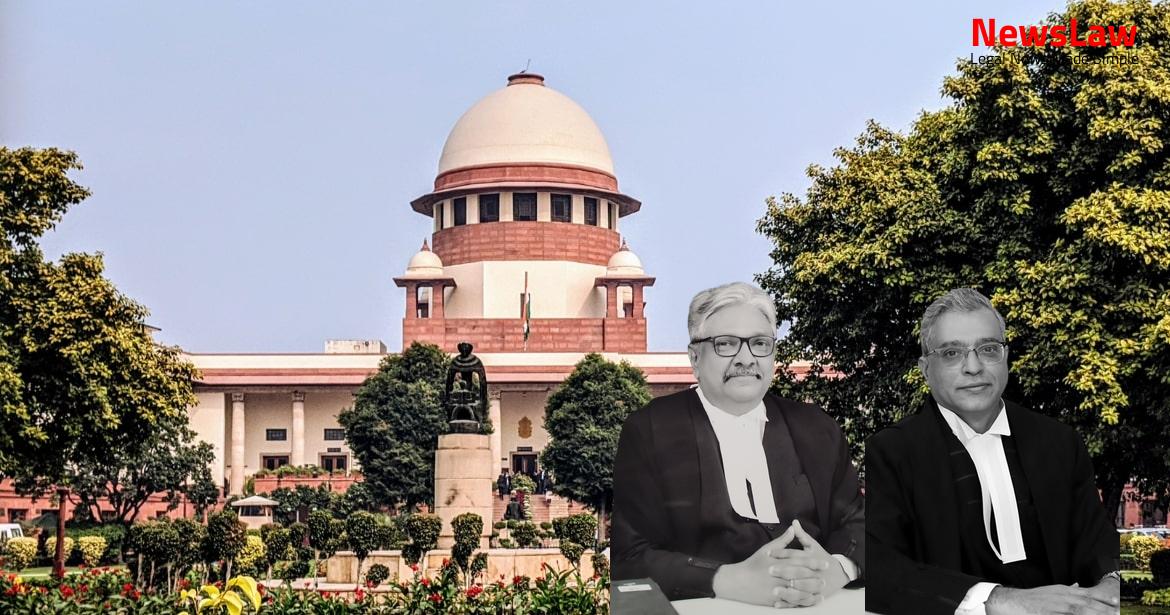Explore the nuanced legal analysis surrounding the debate between reinstatement and compensation in cases of illegal termination. The courts’ interpretation of statutory provisions and precedents play a pivotal role in determining the appropriate remedy for affected employees. Follow along to understand the complexities involved in deciding whether reinstatement or compensation is the more suitable redressal, based on established legal principles.
Arguments
- Learned counsel argues for the reinstatement of the appellant as per the order of the Labour Court, which was set aside by the High Court.
- Citing the case of Shri Manjeet Singh v. Haryana Warehousing Corporation, learned counsel points out non-compliance with Section 25F of the Act.
- The Labour Court had awarded reinstatement of the appellant with 25% back wages.
- It is mentioned that some juniors of the appellant were treated differently and are currently working, with a few even regularised.
- Reference is made to the judgment in Ajaypal Singh by the counsel for the appellant.
- The learned AAG for the respondent highlighted that accepting the appellant’s contention would go against the law established in the case of Secretary, State of Karnataka v. Umadevi and others.
- Reinstatement may not be justified based on the precedent set in the case referenced by the learned AAG.
- Reference was made to the decisions in State of Uttarakhand v. Raj Kumar and others to support the argument.
Also Read: Legal Analysis of Lease Deed Commencement Date
Analysis
- Reinstatement with full back wages is not automatically granted in all cases of illegal termination.
- For regular/permanent workmen terminated illegally, reinstatement with full back wages may be granted.
- In cases of daily-wage workers terminated illegally due to procedural defects, monetary compensation may be given instead of reinstatement with back wages.
- Termination found illegal due to non-payment of retrenchment compensation and notice pay can result in the management terminating the employee by paying the retrenchment compensation.
- Workmen on daily-wage basis have no right to seek regularisation even after reinstatement.
- Public bodies must still comply with Section 25F of the Industrial Disputes Act even if resorting to retrenchment citing non-compliance of Articles 14 and 16 in appointments.
- Termination of a daily-wage worker found to be illegal in certain cases
- Terminated worker should not be denied reinstatement unless there are weighty reasons
- If junior workers were regularized under a policy while the worker was terminated, reinstatement should be considered
- In cases where the worker cannot claim regularisation and has no right to continue as a daily-wage worker, monetary compensation can be given instead of reinstatement
- It may not serve any purpose to reinstate a worker after a long gap if termination was in violation of statutory provisions
- The rationale for not reinstating the worker lies in the fact that a public authority is involved in the case
- Reinstatement cannot be automatic if a transgression of Section 25F is established.
- Compensation is the appropriate remedy in such circumstances.
- Appellant was not working since 2009 following the impugned order.
- Appellant likely employed elsewhere as well.
- Modification of the impugned order to increase compensation to Rs. 3.25 lakhs from Rs. 25,000.
- Appeal partially allowed with the direction to pay the increased compensation within eight weeks from today.
- The increased compensation payment will settle all claims of the appellant.
Also Read: Analysis of Jurisdiction and Exemption in ESI Act Case
Case Title: RANBIR SINGH Vs. EXECUTIVE ENG.P.W.D. (2021 INSC 439)
Case Number: C.A. No.-004483-004483 / 2010



